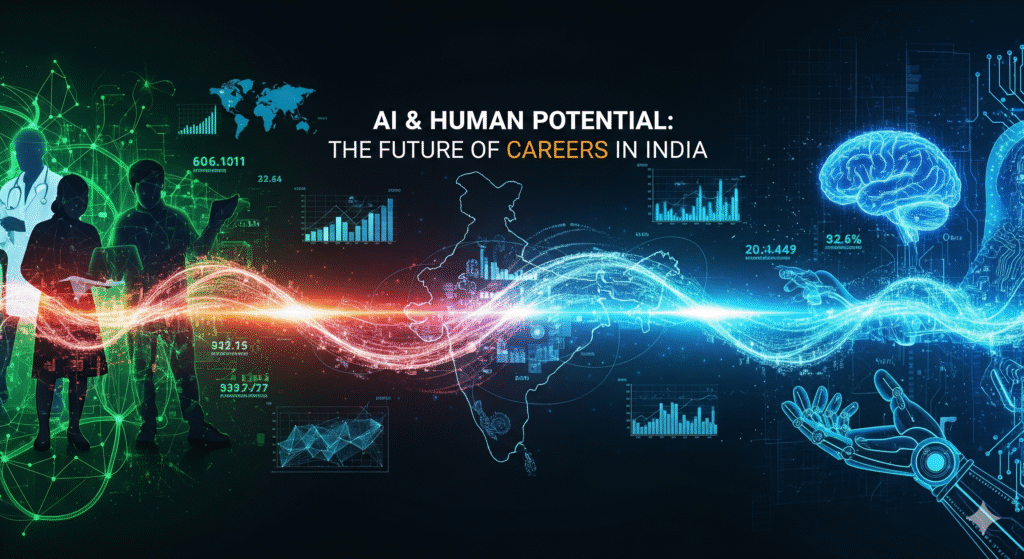
Introduction: The Generative AI Wave and Its Impact on India’s Job Market
The rise of Generative AI—AI that can create new content like text, images, and code—is not just a technological trend; it’s a fundamental shift in the global workforce. For India, with its vast talent pool and booming tech sector, this transformation is both a challenge and an unprecedented opportunity. While early conversations focused on AI replacing jobs, the reality is far more nuanced. We are now entering an era of human-AI collaboration, where professionals who can effectively leverage these tools will become more valuable than ever. This guide will provide a detailed, actionable roadmap for understanding this revolution and strategically positioning your career for success in India’s new AI-driven economy.
Section 1: The Transition from Automation to Human Augmentation
Historically, technology-driven automation focused on performing repetitive tasks, often leading to the elimination of manual roles. Think of assembly line robots or data-entry software. Generative AI, however, represents a new paradigm: augmentation. Instead of replacing human workers, it empowers them by handling the rote, time-consuming aspects of their jobs, allowing them to focus on creativity, strategy, and complex problem-solving.
- For the Content Creator and Marketer: Instead of spending hours brainstorming blog post titles or writing first drafts from scratch, a content marketer can use a tool like ChatGPT to generate multiple ideas and outlines in minutes. This frees up time for market research, developing compelling narratives, and building a stronger brand voice. The human element of understanding a target audience’s emotions remains paramount.
- For the Software Developer: Tools like GitHub Copilot act as an intelligent pair programmer, providing code suggestions, finding bugs, and even generating entire functions from a simple comment. This doesn’t make the human developer obsolete; instead, it allows them to write cleaner code, solve more complex architectural problems, and innovate at a much faster pace.
- For the Financial Analyst: Generative AI can quickly sift through thousands of financial reports and market data to identify trends and create summarized reports. This elevates the analyst’s role from data gatherer to a strategic advisor who can provide actionable insights and make informed decisions based on AI-powered analysis.
Section 2: The New Roles and In-Demand Skills in the AI Economy
The AI revolution is creating a demand for new, highly specialized roles that bridge the gap between human creativity and machine capabilities.
- Prompt Engineer: This is a burgeoning role that requires a blend of technical and communication skills. A prompt engineer is an expert at crafting precise, effective queries to get desired outputs from AI models. They understand the nuances of language and the logic of AI models to optimize results, whether it’s generating a new marketing campaign or debugging code. This role is crucial for businesses looking to get the most value out of their AI investments.
- AI/ML Ethics and Governance Specialist: As AI becomes more integrated into our lives, ensuring it is used responsibly is critical. These professionals develop policies and frameworks to ensure AI systems are fair, transparent, and unbiased. With India’s push for data privacy laws, this role is becoming increasingly important to prevent AI from perpetuating societal biases.
- Data Scientist and Machine Learning Engineer: These roles remain foundational. Data scientists work with large datasets to build and train machine learning models, while ML engineers focus on deploying these models into production environments. The demand for these professionals in India is booming, particularly in sectors like finance, healthcare, and e-commerce.
Section 3: Your Step-by-Step Action Plan to Future-Proof Your Career
Success in this new era isn’t about being an expert in AI from day one, but about adopting a mindset of continuous learning and strategic upskilling. Here is a practical roadmap you can start following today.
Step 1: Get Hands-On with Generative AI Tools.
- For text generation: Spend time experimenting with platforms like ChatGPT or Google Bard. Practice writing different types of prompts and observe how the output changes.
- For image creation: Try Midjourney or DALL-E 2. This helps you understand the creative and technical aspects of AI.
- For coding: If you’re a developer, integrate GitHub Copilot into your workflow.
Step 2: Invest in Targeted Learning.
- Take a Foundational AI Course: Platforms like Coursera and edX offer excellent courses on “Fundamentals of AI” and “Machine Learning Specialization” taught by top universities.
- Develop Prompt Engineering Skills: Look for online workshops and tutorials specifically focused on this emerging skill set.
- Master Data Literacy: No matter your field, a basic understanding of data analysis and visualization will give you a significant advantage.
Step 3: Sharpen Your Human-Centric Skills.
- Creativity and Critical Thinking: Focus on skills that AI cannot replicate, such as abstract reasoning, solving open-ended problems, and generating truly novel ideas.
- Emotional Intelligence and Collaboration: The ability to lead teams, communicate effectively, and build strong professional relationships will become even more valuable in an AI-driven workplace.
Step 4: Build Your Professional Presence.
- Document Your Learning: Share your projects and insights on LinkedIn and other professional platforms. Write about your experiences with AI tools and the challenges you faced.
- Contribute to Open Source Projects: If you are a developer, contributing to open-source AI projects is a great way to gain practical experience and showcase your skills to potential employers.
Conclusion: Thriving in a New Era of Work
The AI revolution is not about surrendering our skills to a machine. Instead, it’s about leveraging technology to become more innovative, efficient, and valuable. For India’s professionals, this is a unique moment to upskill and lead the global charge. By embracing change and focusing on skills that complement AI—not compete with it—you can build a resilient, rewarding, and future-proof career.

Leave a Reply